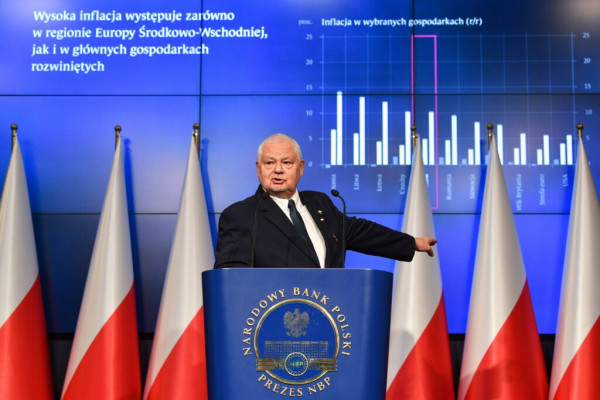Donald Tusk risks ECB brawl after move to put Polish bank boss on trial
WARSAW — A group of lawmakers from Poland’s ruling majority have moved to oust the National Bank of Poland president by submitting a motion Thursday to put Adam Glapiński on trial before a state tribunal.
The motion accuses Glapiński of acting in concert with the former Law and Justice (PiS) government during his term and violating the independence of the central bank.
The decision to move ahead on the pledge, however, is likely to put Polish Prime Minister Donald Tusk on a collision course with the European Central Bank.
The ECB has already offered a legal opinion defending Glapiński on the basis that “any measure affecting your ability to perform your duties as Governor of NBP may, if not lawful, affect your independence and by extension the independence of the General Council.”
The push to get rid of Glapiński comes amid a wider effort by Tusk's coalition government to purge public institutions, such as state broadcaster TVP, of ongoing influence from the right-wing Law and Justice party which ruled Poland from 2015 to 2023.
The motion’s key contents were first reported by TVN24, a US-owned Polish broadcaster. The document contains eight charges against Glapiński listed in an apparent order of importance.
The first two charges concern the NBP’s purchase of Polish Treasury bonds and Treasury-guaranteed bonds issued by the state investment fund PFR and the state development bank BGK during the Covid pandemic.
Through the bond purchases, Glapiński “ensured indirect financing by the NBP of a budget deficit totalling nearly 144 billion złoty (€33 billion),” the motion says, arguing that the purchases were in breach of the Polish constitution.
A related charge is that Glapiński carried out the purchases without the authorization of the Monetary Policy Council, the NBP’s rate-setting body.
Other charges concern the NBP’s interventions on the currency market in December 2020 and March 2022, which the motion says were directed by Glapiński, again, without the authorization of the NBP’s management board.
The document adds that Glapiński was the prime force behind the NBP's decision in September and October last year to slash its reference interest rate by a combined 1 percentage point to 5.75 percent, aiming to benefit the incumbent government in the immediate run-up to national elections.
The move was “directly linked to the election campaign and led to the weakening of the Polish currency,” the motion’s text says, arguing that this, too, breaches the Constitution.

Other charges allege Glapiński obstructed information flow inside the NBP and misled the government about the NBP's financial result for 2023. It alleges that the bank indicated it would deliver a profit when, according to projections cited on Thursday, it is set to post a 17 billion złoty loss when it reports its annual results in April.
The bank is expected to follow in the footsteps of other Eurosystem central banks and post a heavy operating loss for last year, but its bottom line may look different due to its portfolio management, not least if it revalues its gold reserves higher, as some peers in Western Europe have done.
The motion also accuses Glapiński of illegally granting himself a bonus each quarter and, finally, of engaging in day-to-day politicking, “praising the [previous] government of Mateusz Morawiecki and warning against the [incumbent] government of Donald Tusk."
The politicization of independence
Putting Glapiński before the State Tribunal — a special court to try top public figures — was one of Tusk’s pledges in the election campaign last year, when the four-party coalition he led won power from the populist right-wing government of Law and Justice (PiS).
Tusk said several times both during the campaign and after taking over power in December that Glapiński compromised the independence of the NBP by helping the then-ruling PiS government in the run-up to the election.
The problem for Tusk is the European Central Bank's position that any attempt to try the NBP boss will violate the EU Treaty’s provisions on central bank independence. That warning has turned the tables on the former European Council president.
A second problem is that the controversial rate cuts have not thus far been any obstacle to delivering the central bank's mandate of price stability: inflation fell to 2.8 percent in February, within the NBP's target range of 1.5-3.5 percent. It's expected to fall to 2.5 percent, the exact middle of that range, in March.
A third problem is that the purchases of government assets mentioned in the charges was official policy in virtually every major Western economy during the pandemic, including at the ECB.
Putting Glapiński on trial further risks flinging the country even deeper into a constitutional crisis in the context of Tusk's ongoing struggle to restore the rule of European Union law in Poland.
The Constitutional Tribunal, which Tusk wants overhauled on the grounds that PiS destroyed its independence too, said in a judgment in January that a motion to put Glapiński on trial must pass parliament by a majority of three-fifths. The Tusk coalition does not have that majority but the PM and other figures close to the government have hinted they would simply ignore that ruling.
The motion now goes to a special parliamentary committee that will report on it and put it to a vote at a date still to be decided. According to the regulations governing the work of State Tribunal, Glapiński will be suspended if the parliament decides he should face trial.
There was no immediate reaction from the NBP to the publication of the charges other than to set up a special section on its website aggregating explainers — such as on the NBP's financial result — and news and opinion articles against “political attacks on the NBP.”